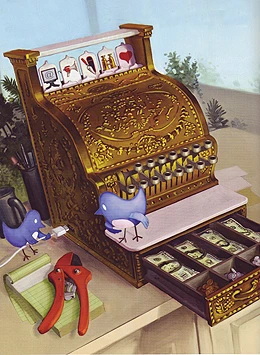
 Chad Harris, owner of The Garden Gates in the New Orleans suburb of Metairie, has broken more than a few molds—and bent most of the rest. So a recent proclamation that he can see the future—Harris talking, mind you—probably shouldn’t be considered outlandish or, even, remotely brash. In fact, given the man’s track record at running a garden center, it probably should be considered noteworthy.
Chad Harris, owner of The Garden Gates in the New Orleans suburb of Metairie, has broken more than a few molds—and bent most of the rest. So a recent proclamation that he can see the future—Harris talking, mind you—probably shouldn’t be considered outlandish or, even, remotely brash. In fact, given the man’s track record at running a garden center, it probably should be considered noteworthy.
That’s noteworthy, as in “get out pen and paper and begin taking notes because there will be a test on this.”
The test will come down the proverbial road, when you’re in stare-down mode with a shaky economy and storm clouds—both figurative and literal—that are preparing to mount an offensive.
Trust Chad Harris on this one: Those literal clouds can mount one mightily offensive, offensive.
Five years ago, a Category Five hurricane named Katrina nearly wiped the greater New Orleans area off the map. By then, Harris was in his sixth year operating the region’s “go to” garden center. He and wife Beth had turned The Garden Gates into a commercial enterprise that earned more than $1 million in sales volume. It was a destination spot not just for gardeners but for anyone with a mind on improving his or her lifestyle.
In a matter of a few hours on Aug. 26 of 2005, doing the latter took on a whole new meaning in The Big Easy. The residents and businesses prepared for the worst—and got it. The city’s infrastructure was all but destroyed. Many businesses never recovered or simply relocated. The Harris family lost a house and five commercial properties—but not their resolve.
In six weeks, still living in a storehouse and bathing under a makeshift shower Chad rigged for his family, the Harrises introduced The Garden Gates, Part Deux. And last year, despite the local depression and the national recession—not to mention a marketing pie offering considerably smaller slices than its pre-Katrina predecessor, the company enjoyed its best year yet. Year 2009 sales more than doubled the numbers preceding the storm.
“If I have any advice to give to other retailers, it’s never, NEVER stop trying,” Chad Harris said. “Even when the worst possible thing you can think of cripples your ability to survive—never stop trying.”
For the record, he has more advice—plenty, in fact. Here’s where you’ll want to get out that pen …
The Man Has a Plan
 The Garden Gates’ “lifestyle center” is located in a 110-year-old home in a quaint southern Louisiana neighborhood.The Garden Gates’ newest incarnation is located in a 110-year-old home in a quaint neighborhood. The store proper features about 2,000 square-feet of interior space and 1.5 acres of outdoor sales area. Its fare ranges the gamut, with plants and upscale decorative items that you won’t find elsewhere representing the norm.
The Garden Gates’ “lifestyle center” is located in a 110-year-old home in a quaint southern Louisiana neighborhood.The Garden Gates’ newest incarnation is located in a 110-year-old home in a quaint neighborhood. The store proper features about 2,000 square-feet of interior space and 1.5 acres of outdoor sales area. Its fare ranges the gamut, with plants and upscale decorative items that you won’t find elsewhere representing the norm.
Harris’ keen 20-20 foresight played a significant role in the store’s comback. And if vision is his gift, sharing it is his calling. He doesn’t know how his peers will respond, but he is convinced that the tack he is taking at his own center is a blueprint the entire industry can emulate.
“Some time ago it became apparent the garden center industry was having an increasingly difficult time attracting new customers when the retail landscape was changing at a pace that the ‘Retail Giants’ were modeling,” Harris said. By “giants,” he means “the blue guys and the orange guys”—and any other “bad guys” slicing into the gardening and lifestyle market.
He devised a strategy to counter what these giants were doing, first studying the companies’ growth strategies and reading everything he could find about their CEOs. “I learned a lifetime of knowledge in just a few months,” he said. “I concluded that the best way to compete was to perform miracles for all to witness. We would give more than we took, service greater than expected and do it all with quality products and services.”
What emerged was a 5-point plan that, essentially, lifted The Garden Gates “off the mat” and “onto the map.” This summer the business was named one of the “Top 50 Specialty Retail Stores” by Home Accents Today magazine.
Here is How You Corner the Market
Harris said the key to making this plan work entails trading whatever your current “box” is for his newer version:
Become a virtual giant. “In order to compete in the future, maybe 10 years from today, we need to be creating business enterprises that operate based on how our future customers will embrace retailing,” he said. “Take a sneak peek into a 12-year-old’s world today and consider them as a customer. How do they use the Internet, mobile devices and the technology that will transform the future of retailing? Is the Web the answer? Consider this: Local customers today search the Internet before they climb in their cars to make their purchases.”
On his own home front, Harris has introduced two websites, one for information about the store and another for selling items from it. His e-commerce operation was one of the first in the country, and he continues to grow it and his product fare every year.
Harris knows the typical garden center might not want to dip its toes so deeply into this water. No matter; he believes those that don’t at least do some “e-exploring” will be left behind. “If you don’t have a website, consider building one,” he said. “If this doesn’t fit within your budget, take a few minutes and complete the local sections of all the web-search companies. For instance, there’s “Google Places,” where you can create store hours, upload pictures and give a quick note about your business. Then that information will come up in search engines when people are searching for your products locally.”
The next big wave for the industry to catch, he said, is social media. Facebook, YouTube channels, LinkedIn are all free services that can help retailers connect with the market.
Ultimately, Harris said, all garden center operators should build a website that represents their company—and be ready to keep it fresh. “Search the Web, and you can find thousands of sites that are just horrible,” he said. “Don’t be one of those.”
Market like a mad person. Harris recommends channeling marketing energy/dollars in five directions:
- TV – Consider creating television ads, and run them on local cable stations during popular shows like ‘Real Housewives’ or ‘Top Chef’ on Bravo. “They are affordable and great ways to market to your customer,” he said. Another idea: Find an up-and-coming film student who needs to work on

Explore the September 2010 Issue
Check out more from this issue and find your next story to read.
Latest from Garden Center
- This Florida garden center's busiest days are in the fall, not spring. Find out how they do it
- Terra Nova Nurseries releases new agastache variety, 'Peach Pearl'
- The Certified Shopify Online Garden Center provides local retailers with ecommerce tool
- Meet the All-America Selections AAS winners for 2025
- Endless Summer hydrangeas and Suntory Senetti glam up Grammys red carpet
- Ball Seed releases 2025 edition of 'Thrive and Flourish' for landscape and garden retail
- American Floral Endowment's Fred C. Gloeckner Foundation Research Fund accepting grant proposals
- Floral Marketing Fund and CalFlowers partner to advance floral industry





